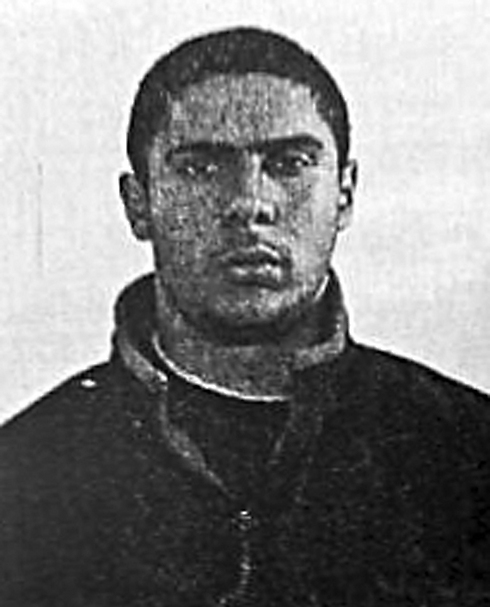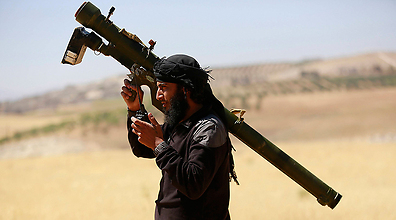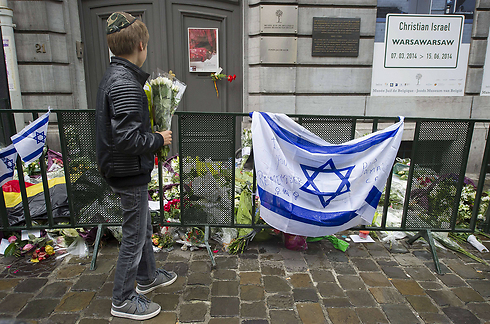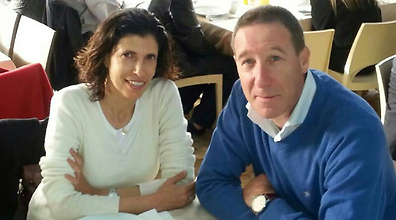
Brussels attack possible result of French blunder
French report claims that shooting suspect Mehdi Nemmouche wasn't on 'List S' as authorities maintain; suspect passed through several countries un-hindered.
An error by French authorities may have been the reason that measures weren't taken to preemptively arrest 29-year-old Mehdi Nemmouche and prevent last week's shooting attack at a Jewish Museum in Brussels, reported France's Le Nouvel Observateur Tuesday.
Nemmouche is the chief suspect in the shooting that killed at least three people including an Israeli couple from Tel Aviv. Upon his arrest he was found with a video in which a voice said the film was made because a camera meant to broadcast the killings live failed to function.
According to the French publication, Paris Prosecutor Francois Mullens said in a press conference that after being radicalized in prison and traveling to Syria to join in the civil war, Nemmouche had been added to "List S", a list used by French security forces that names individuals considered to be a threat to state security.
Related Stories
- Police question two additional suspects possibly connected to Brussels attack
-
Belgium police publish photos of Brussels Jewish Museum shooter
Netanyahu: Europe condemns Brussels attack but talk of friendship with Hamas
The report quoted Mullens in the Sunday press conference saying that German authorities had notified the French upon Nemmouche's arrival at the airport in Frankfurt, apparently returning to Europe from fighting in Syria.
Despite German cooperation however, no moves were made to arrest Nemmouche until after the attack when he arrived in France. Le Nouvel Observateur reported that journalists checked an updated "List S" and were unable to find Nemmouche among the names of dangerous individuals.
According to the report, "List S" contained a different name of interest - that of Nemmouche's uncle, 48-year-old Aamar Nemmouche. Le Nouvel Observateur claimed that Aamar had been included in the list for his extremist Salafi associations.
Aamar reportedly learned the principles of Islam while in Saudi Arabia where he settled down, met an Imam with extremist tendencies, and became his follower. Aamar later appeared again in France and Belgium where he promoted the Imam's teachings.
French authorities have yet to make any reply to the Le Nouvel Observateur report.
Steps Against Jihad
Since Syria became a magnet for Westerners, European nations have been slowly fortifying themselves with measures to detect potential jihadists and counter any plots. But French-born Nemmouche - the first Western citizen returning from Syria to be implicated in a major attack - was arrested after being caught by chance, in a spot check for drugs by a customs official, making a mockery of efforts to counter the threat.
Besides the reports that he landed in Germany without being arrested, the suspect had also apparently slipped through a handful of countries from Asia to Europe in the three months after leaving Syria, a French prosecutor said, a clear sign of the difficulties of tracking returnees.
Whether or not he was the Brussels shooter, the portrait provided by authorities of Nemmouche, 29, is of a dangerous man. They say when he was arrested Friday at the Marseille bus station he was heavily armed, carrying a large supply of ammunition and a banner of Syria's most notorious fighting group, the Islamic State of Iraq and the Levant.
Between 1,000 and 1,500 Europeans may currently be fighting in Syria against President Bashar Assad, according to Charles Lister, an analyst with Brookings Doha Center, who drew the estimate from governments and other sources. Each one who returns represents a potential threat, according to official European thinking, and the challenge to track them all is huge. The arrest of the French suspect in the Belgian attack also opens the possibility that a returnee could choose to attack a country other than his homeland.
Thomas Hegghammer, an expert on foreign fighters at the Norwegian Defense Research Establishment, says that attacks by one person are far harder to thwart than large-scale operations.
European governments "are quite well positioned to thwart larger plots involving several people," Hegghammer said. "They're not able to stop all the smaller, simpler attacks like the one in Brussels, with one person and a gun."
In its annual report issued last month, The EU's police organization Europol said radicals who travel to fight alongside militants in conflicts like the Syrian civil war are "posing an increased threat to all EU member states on their return."
A leading French criminologist who advised former President Nicolas Sarkozy said that a lack of coordination and data-sharing among nations - even within the EU - stunts measures to counter the threat.
"The task is not impossible," said Alain Bauer. "You need greater and better coordination."
A major issue, he said, is that nations are concerned that sharing information will endanger sources.
Bauer underscored the importance of catching the traveler before he embarks. And this means "early intelligence, early warning, early detection. That is something we don't do," he said.
Some Action Already Taken
France feels particularly vulnerable because it has the highest estimated number of youths heading to Syria or fighting there - about 700. It rolled out new measures in April to prevent its citizens and legal residents from joining the jihad and protect against potential threats posed by returnees, including canceling French passports and deporting foreign residents.
The Dutch government has already canceled the passports of 11 people where authorities provided good reason to suspect an individual may harm Dutch national interests while abroad. Britain has also withdrawn passports under a "Royal Prerogative." It doesn't release figures, but according to the Bureau of Investigative Journalism, Home Secretary Theresa May in 2013 removed the citizenship of 20 individuals, including many who were suspected of planning trips to Syria.
However, softer approaches also are on the books in Britain and elsewhere.
In France, a series of tough-love measures introduced in April includes a hotline for parents who fear their children are at risk of taking up jihad in Syria. In conjunction with European partners, France plans to increase monitoring of Web sites that post videos and other messages inciting jihadist activities.
The Dutch have an elaborate program to counter the jihadist phenomenon that sent about 100 youths to Syria, of whom 10 were killed and 20 have so far returned. Besides canceling passports, an unspecified number of minors have been stopped from leaving, some placed in juvenile detention.
Belgium, which says about 150 of its citizens are in Syria, has set up programs in sensitive towns to improve cooperation among authorities, and designated a "prevention specialist" in 29 towns. A national prevention cell brings together police, experts and social workers in an outreach similar to France's proposals.
The UK's long-standing Prevent program liaises with schools, volunteer agencies and other local groups to detect a potential extremist. It recently encouraged women to reach out to other women concerned about potential jihadists on the home front.
Some 320 extremists from Germany are currently in Syria, and some 50 have returned, but the authorities maintained a hands-off approach until recently, allowing them to fly out and return without being stopped because terrorism in Syria is difficult to prove. More recently, those suspected of plans to join Syrian jihadist groups are being stopped at airports before they fly out and are tracked upon return, but land routes remain open.
The Associated Press contributed to this report.














